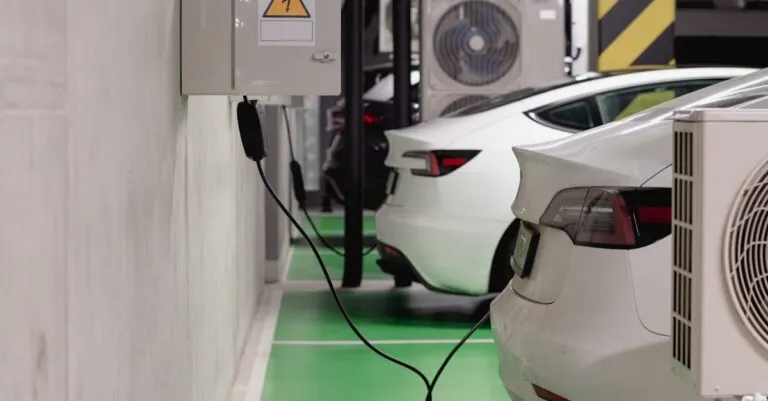Table of Contents
ToggleElectric vehicles are zooming into the spotlight, and with them come a whole new set of questions—like how much will it cost to insure these futuristic rides? While EVs promise savings at the pump, many drivers are left scratching their heads when it comes to insurance rates. Spoiler alert: it’s not as straightforward as plugging in your car overnight.
Understanding Insurance Rates for EVs
Understanding insurance rates for electric vehicles requires knowledge of various influencing factors. Rates fluctuate based on numerous criteria specific to the vehicle and the driver.
Factors Influencing Insurance Rates
Premiums depend on vehicle value, safety features, and repair costs. Electric vehicles often come with advanced technology that can increase repair expenses. Additionally, driver experience and location play significant roles in determining insurance costs. Higher risk areas lead to increased premiums due to greater likelihood of accidents or theft. The age of the vehicle influences rates as well; newer models may carry higher premiums because of their greater market value.
Comparison with Traditional Vehicles
Insurance rates for electric vehicles generally differ from those for traditional vehicles. Traditional vehicles often cost less to repair, leading to lower premiums. Electric vehicles usually feature a higher upfront cost, which can elevate insurance expenses. While EVs may qualify for discounts due to their eco-friendly status, this benefit varies by insurer. Driving patterns also impact rates; individuals driving shorter distances might experience lower premiums, whether they drive an EV or a gasoline vehicle.
Benefits of Insuring EVs
Insuring electric vehicles (EVs) presents unique advantages that can lead to cost savings and additional benefits for drivers.
Lower Maintenance Costs
Electric vehicles incur lower maintenance costs compared to traditional gasoline vehicles. Fewer moving parts result in less wear and tear, leading to reduced maintenance needs. Many EVs utilize regenerative braking systems, extending the life of brake components. Due to the absence of oil changes, drivers save on service expenses. According to the Auto Insurance Center, EV owners save around 30% on average in maintenance costs throughout their vehicle’s life. Overall, these financial benefits reflect positively in insurance rates, potentially resulting in lower premiums.
Eco-Friendly Incentives
Insurance companies may offer eco-friendly incentives to EV owners. Many insurers recognize the environmental benefits of electric vehicles and provide discounts for drivers who choose greener options. Examples of incentives include reduced premiums and safe driver discounts when using EVs. Some states also provide tax rebates and credits for EV ownership, enhancing the overall savings throughout ownership. These incentives contribute to a general perception that insuring an EV can be more advantageous than insuring a traditional vehicle.
Challenges in EV Insurance
Electric vehicle (EV) insurance presents several challenges that complicate the process for consumers. Understanding these obstacles helps clarify why insurance rates vary significantly.
Limited Availability of Policies
Many insurance providers offer a limited range of policies specifically tailored for electric vehicles. Only a few companies have specialized knowledge and experience in insuring EVs, which can restrict options for consumers. Selecting an insurance plan without sufficient coverage can leave drivers exposed financially. Availability also varies by region, meaning some areas may provide more options than others. As a result, consumers often face difficulty finding adequate coverage that meets their unique needs.
Higher Repair Costs
Repairing electric vehicles often incurs higher costs due to the specialized parts and technology involved. Electric motors and battery systems are more complex than traditional vehicle components. Additionally, finding qualified technicians to service EVs can lead to increased labor costs. Data indicates that EV repairs can cost up to 30% more than those for conventional vehicles. Factors such as these contribute to the overall higher insurance premiums associated with electric cars, illustrating a need for careful consideration when choosing coverage.
Tips for Reducing Insurance Rates for EVs
Reducing insurance rates for electric vehicles (EVs) can significantly lower overall ownership costs. Several strategies can help in achieving this goal.
Shopping Around for Quotes
Collecting quotes from multiple insurance providers offers a great way to find competitive rates. Each insurer evaluates risk factors differently, leading to variations in premiums. Comparing options can reveal policies that provide better coverage at lower prices. Use online comparison tools to obtain quotes quickly and efficiently. Consider contacting local agents as they may provide tailored discounts or insights based on specific circumstances. Seeking out specialized insurance companies that focus on EVs could result in more favorable terms.
Utilizing Discounts and Incentives
Many insurers offer discounts specifically for electric vehicle owners. Eco-friendly incentives are increasingly common, which can reduce premiums. Safe driver discounts often apply, rewarding those with clean driving records. Additional savings may be available through bundles that combine various insurance options. States may provide tax rebates or credits for EV purchasers, enhancing financial advantages. Confirm eligibility for these programs before finalizing any policy. By taking advantage of these discounts, drivers can substantially lower their insurance costs.
Navigating insurance rates for electric vehicles can be complex yet rewarding. With the right strategies and knowledge, drivers can find competitive rates that reflect the unique advantages of EV ownership. By understanding the factors influencing premiums and leveraging available discounts, they can make informed decisions that lead to significant savings. As the market for electric vehicles continues to grow, it’s essential for consumers to stay informed about their insurance options. This proactive approach not only ensures adequate coverage but also enhances the overall experience of owning an electric vehicle.







